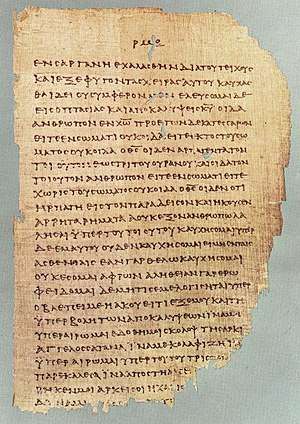2 Corinthians 10
| 2 Corinthians 10 | |
|---|---|
 A folio of Papyrus 46 (written c. AD 200), containing 2 Corinthians 11:33-12:9. This manuscript contains almost complete parts of the whole Pauline epistles. | |
| Book | Second Epistle to the Corinthians |
| Bible part | New Testament |
| Order in the Bible part | 8 |
| Category | Pauline epistles |
2 Corinthians 10 is the tenth chapter of the Second Epistle to the Corinthians in the New Testament of the Christian Bible. It is authored by Paul the Apostle and Saint Timothy.[1][2] According to theologian Heinrich August Wilhelm Meyer, chapters 10–13 "contain the third chief section of the Epistle, the apostle’s polemic vindication of his apostolic dignity and efficiency, and then the conclusion".[3]
Text
- The original text is written in Koine Greek.
- Some most ancient manuscripts containing this chapter are:
- Papyrus 46 (c. AD 200)
- Codex Vaticanus (AD 325-350)
- Codex Sinaiticus (AD 330-360)
- Codex Alexandrinus (c. AD 400-440)
- Codex Ephraemi Rescriptus (c. AD 450; extant: verses 1-7)
- Codex Freerianus (c. AD 450; extant: verses 1,8-10,17-18)
- Codex Claromontanus (c. AD 550)
- This chapter is divided into 18 verses.
Structure
The New King James Version organises this chapter as follows:
- 2 Corinthians 10:1-6 = The Spiritual War
- 2 Corinthians 10:7-11 = Reality of Paul’s Authority
- 2 Corinthians 10:12-18 = Limits of Paul’s Authority
Cross reference
Verse 4
- The weapons we fight with are not the weapons of the world (New International Version).[4]
The weapons (Greek: ὅπλα, opla) which Paul refers to are "not carnal", (Greek: ου σαρκικα, ou sarkika). He does not rely on human power and authority or on learning or eloquence.[5]
Verse 10
Paul knows that he is criticised for being bold and direct in his writings but treated as weak and unassertive when he is present: he has made the same point in verse 1,
- I who am humble when face to face with you, but bold toward you when I am away.[6]
Biblical commentator Edward Plumptre notes also the criticism that Paul's delay in returning to Corinth, which he has explained in 2 Corinthians 2:15-17, was also considered to be "a proof that he was shirking [an] encounter".[7]
Verse 17
- But “he who glories, let him glory in the Lord.”[8]
- But he that glorieth, let him glory in the Lord.
Not in himself, nor in his outward circumstances of life, or inward endowments of mind; not in his natural or acquired parts; not in his wisdom, knowledge, learning, and eloquence; nor in his own righteousness, labours, and services, much less in other men's labours; nor in his own sense of himself; nor in the opinion and popular applause of others; but in the Lord Jesus Christ, as the author and donor of all gifts, natural and spiritual; in his wisdom, righteousness, sanctification, and redemption; and in his judgment and approbation of men and things, which sense the following words direct unto.[9]
See also
- Macedonia
- Titus
- Other related Bible parts: Psalm 34, Psalm 44, Jeremiah 9, 1 Corinthians 1, 2 Corinthians 11
References
- ↑ Halley, Henry H. Halley's Bible Handbook: an Abbreviated Bible Commentary. 23rd edition. Zondervan Publishing House. 1962.
- ↑ Holman Illustrated Bible Handbook. Holman Bible Publishers, Nashville, Tennessee. 2012.
- ↑ Meyer's NT Commentary on 2 Corinthians 10, accessed 8 September 2017
- ↑ 2 Corinthians 10:4
- ↑ Benson Commentary on 2 Corinthians 10, accessed 8 September 2017
- ↑ 2 Corinthians 10:1
- ↑ Plumptre, E., Ellicott's Commentary for Modern Readers on 2 Corinthians 10, accessed 9 September 2017
- ↑ 2 Corinthians 10:17
- ↑ John Gill's Exposition of the Entire Bible, 2 Corinthians 10:17